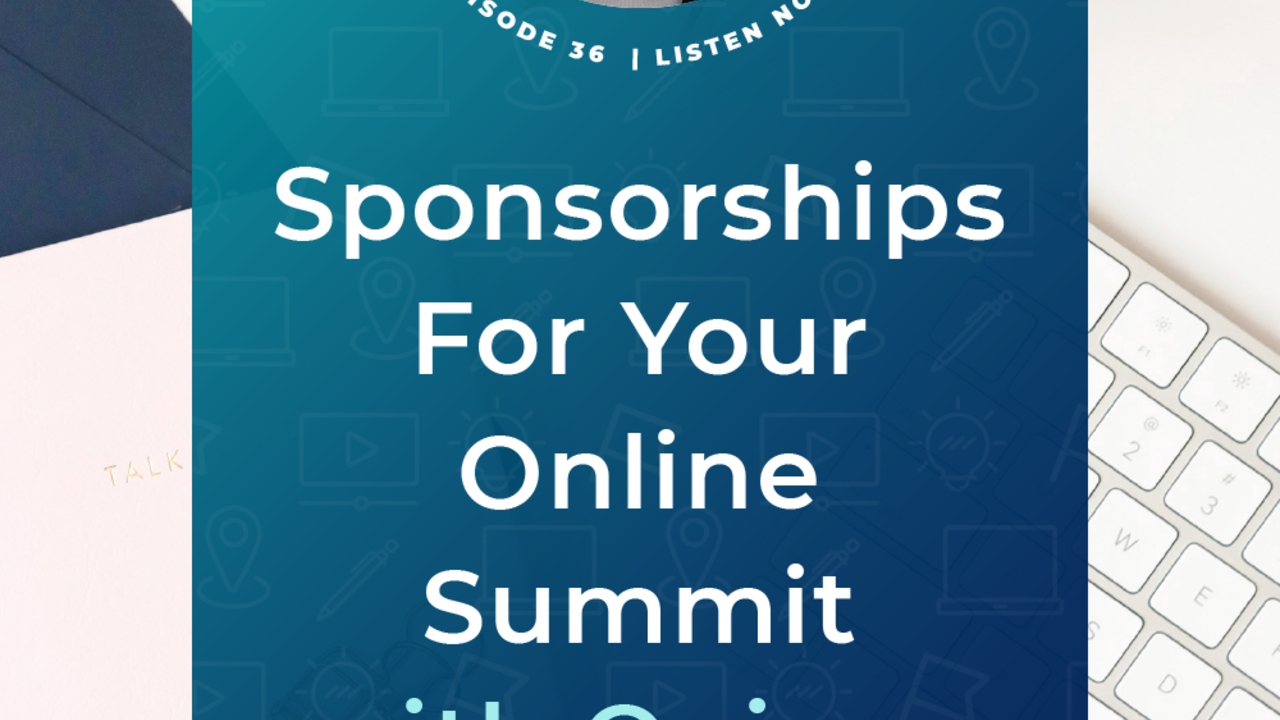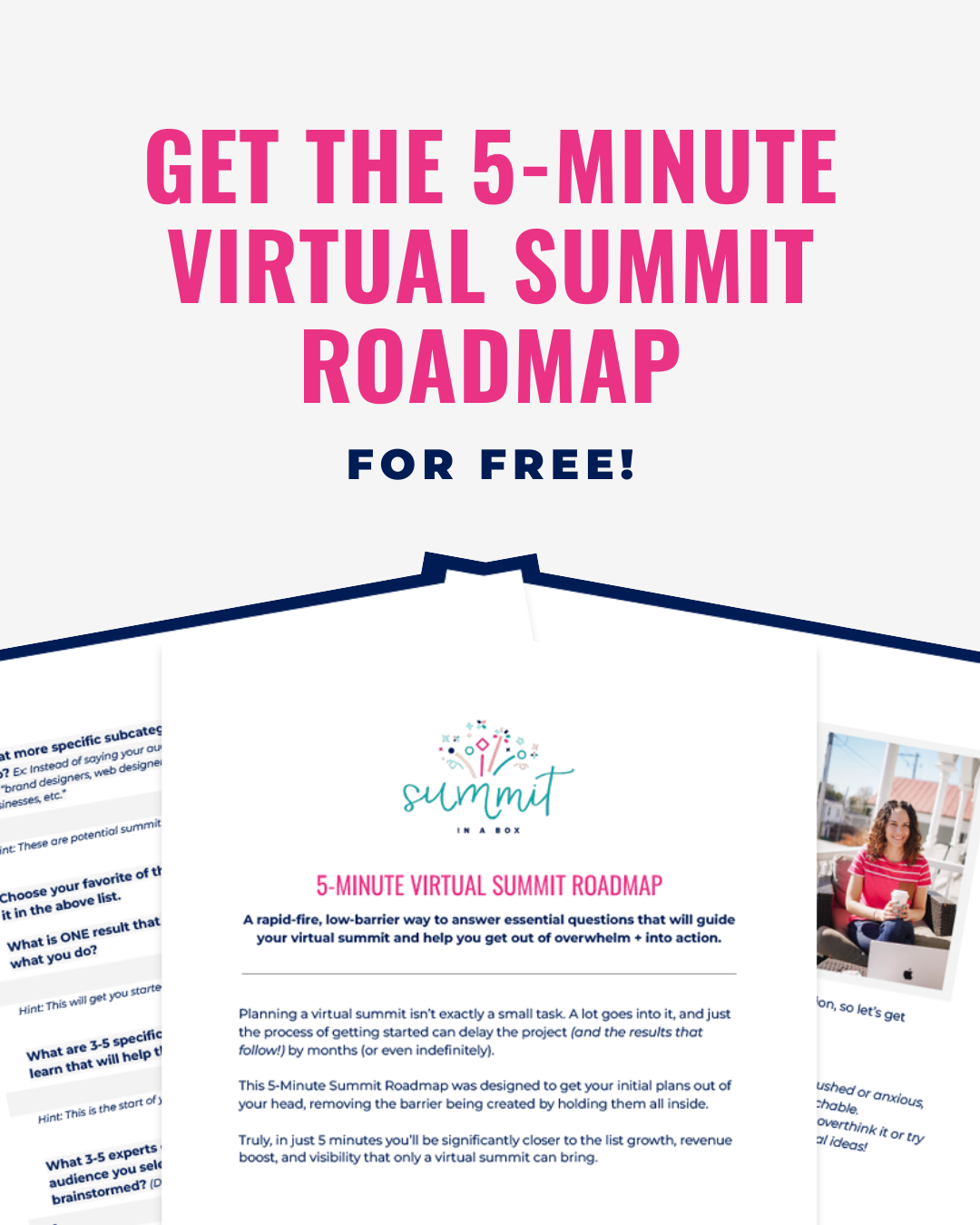The Basics of Virtual Summit Sponsorships with Quiana Murray

 If you're like me, you have no idea where to begin with sponsorships for your virtual summit. You know they can be beneficial and help bring in money to make your summit thrive and reach more attendees, but how do you approach sponsorships?
If you're like me, you have no idea where to begin with sponsorships for your virtual summit. You know they can be beneficial and help bring in money to make your summit thrive and reach more attendees, but how do you approach sponsorships?
This week we're chatting with Quiana Murray about all things sponsorships.
We cover everything from:
- how to decide if you should have sponsors,
- how to pitch them,
- and how much to charge.
I'll let Quiana take it from here!
Virtual Summit Sponsorships
There are two main considerations to keep in mind when thinking about sponsorships and virtual summits.
The first thing to consider's time. Give yourself 3-6 months to nail down sponsorships for your virtual summit.
The second thing to consider's your community. What you’re selling to sponsors is the opportunity to laser market to your people. Traditional marketing isn’t working for larger businesses anymore. They’re starting to spend the bulk of their marketing budgets on influencers, celebrities, small business owners, and community organizations because they’re already on the front lines with those people that they want to buy their products and services.
If you have a community, even if it’s 100 people, there is a corporation out there that wants your 100 people to spend that money. Know your community in and out so that if you can find a way to get a sponsor in front of them without them feeling sold to or marketed to, you’re going to do well.
Preparing for Sponsors
If you’re thinking about approaching sponsors, there are a few things to consider.
- Determine what to sponsor. Think about yourself and your brand because there’s a portion of you in your business that’s going to speak to each individual company.
- Think about your positioning. One big thing in the sponsorship world is “category exclusivity”. Think about which sponsorship aligns with your community.
- Look at your time. You’re going to have to do what you told them you’ll do. Be sure you’ll have the bandwidth to do what you said you could do for them.
- Consider the communication about what each side wants. Think about what the sponsors want versus what your people want and how you can bring them together in an environment where both feel like they’re getting something out of it.
How to Tell if a Company Isn’t a Good Fit
Next, let’s talk about how to tell if a company isn’t a good fit. Start with what you need and the type of experience you want your people to have.
For example, if I were running a summit on sponsorship, I know that my people are going to need access to reliable software so that they can build those proposals and things like that. I know that my people are also going to need some type of analytics because they need to be able to know their audience.
So, when you start breaking down the things that you’re going to be wanting your people to not only learn but to do, and the systems that they’re wanting to be using, then you look at which of those companies provide something within that industry.
And it may not be a perfect fit, but most people fall into one of these categories:
- help people generate money
- help people save time
- help people learn a new skill
Make a list of all the things that you want your people to experience, things that your people are interested in, and things that you know that they’re going to need to either purchase, use, or consume to get where it is they need to get. Write down companies that offer any of those things and pitch them.
When to Pitch Packages to Sponsors
Next let’s talk about pitching packages to your sponsors. If you don’t take anything else from this, always start with just a conversation.
Ask them questions. They should be the ones doing most of the talking, not you. Every company has a mission, vision, and their overarching community or customer profile. But then they have that profile of that person who they might not have really gotten their hands on yet.
Here are some questions to ask:
- What are your goals for next quarter?
- What products and services are you offering?
- Are there new products or services you plan to debut?
What Information to Include in Your Pitch
Once you’ve had a conversation and you’re ready to pitch, provide details about your community. For example, they tend to buy ads on YouTube as opposed to ads on Facebook. They tend to base their purchasing decisions around what’s going to be the most convenient product rather than what’s the cheapest cost.
These are the kinds of things that big companies just don’t know because they’re not having those conversations.
In addition to that, make sure that you put in customized benefits for their company. What can their specific company hope to get out of this? What will their company benefit by offering a sponsorship that someone else wouldn’t?
Lastly, include information about your summit. Include things like the platform it’s hosted on, if there’s an email list, and the summit’s schedule. Also, include information about how you plan to grow as a business by hosting the summit and if you plan to have a reoccurring summit. Put how much it’s going to cost. This is a corporation, and they don’t want to be surprised. This allows the opportunity to negotiate.
Quiana’s Biggest Takeaway
My biggest takeaway is to know your community. Don’t just know where they like to shop but know them in a way that empowers you to be able to charge for someone to get that knowledge from you.

 Quiana Murray is an award-winning Sponsorship Strategist and founder of the Sponsorship Fast Track Academy. With over 20+ years in the sponsorship industry, Quiana has personally mentored sponsorship seekers through the full sponsorship life cycle. Additionally, she has successfully partnered with international corporations and State and Federal agencies to successfully purchase sponsorship.
Quiana Murray is an award-winning Sponsorship Strategist and founder of the Sponsorship Fast Track Academy. With over 20+ years in the sponsorship industry, Quiana has personally mentored sponsorship seekers through the full sponsorship life cycle. Additionally, she has successfully partnered with international corporations and State and Federal agencies to successfully purchase sponsorship.
